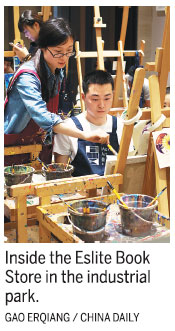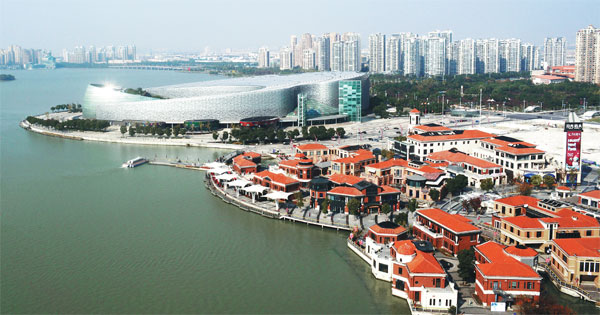Industry with a global view
Updated: 2016-06-24 08:46
By Andrew Moody(China Daily Europe)
|
|||||||||
Early enterprise development zone made the most of infrastructure, foreign investment
Yang Zhiping says the success of the Suzhou Industrial Park depends on bringing in talented people from around the world.
The 52-year-old chairman of the park says it is the quality of its international expertise that is behind its success as one of China's most successful enterprise areas.
|
The Suzhou Industrial Park attracts talented people. Provided to China Daily |
Some 70 percent of the people who live and work in the 288 sq km area are from outside of Suzhou.
"We don't just attract local people but we attract talents from around the world. Suzhou, of course, has a history of 2,500 years and has been a strong commercial area based on the Yangtze River Delta, but one of its strengths has been its international outlook."
Yang was speaking in his office in the Xiandai Building on the park, which is one of the highest ranking of China's national high-tech parks.
Some 80,000 companies are located in the area, of which 5,550 are foreign, including Samsung, Bosch, Siemens and Microsoft.

The GDP of the SIP grew by 8 percent last year (significantly higher than the 6.8 percent nationally) to 206 billion yuan ($31.4 billion), bringing in tax revenues of 24.1 billion yuan.
"These kinds of parks are important for the development of China. It took the United States in its market economy more than 200 years to develop Silicon Valley in the 1990s. We couldn't wait that long," he said.
"In the normal environment outside the park it is not so easy for startup companies to get the support to make their businesses successful. They don't have the level of service, favorable policies or access to venture capital or the pools of talented people."
The SIP was originally formed as a joint venture between the China and Singapore governments as the China-Singapore Suzhou Industrial Park in 1994.
It was one of China's first EDZs (Enterprise Development Zones) and an attempt to replicate the success of such zones in Singapore, which was seen as a model for China's development.
"It was never something we could just copy and paste. Singapore has a UK heritage, from its legal system through to its parliament, and China has its own different law system and administration. We do share some cultural background but it was a matter of adapting to what suited China."
Back in the 1990s, the vast expanse of what is now a vast perfectly landscaped area consisting of state-of-the-art offices, laboratories as well as hotels, restaurants and the homes of some 1.2 million residents looked very different.
"We had nothing. It was just farmland. Our challenge then was not building a new city but beginning a process of industrial development, which meant attracting foreign investment."
Many of the first companies that moved in to the park were from Singapore but officials were also successful in attracting a number of Fortune 500 companies, including Siemens and Samsung.
"We had a lot of help at the outset from the Singapore side. We didn't have a reputation then and they helped us quite a lot in the marketing," he said.
After establishing an industrial base, the next phase of its development, which began in the last decade, was to become the home of start-up, innovative and creative companies.
It was helped in this by being designated as one of China's now 115 national high-tech parks in 2006. It is now ranked among the top 10 of these in the country.
"We set up our own one-stop service center. Small companies that have between five and 10 people had no idea about legal services, financial accounting or even how to organize a company. We helped them in a whole range of areas including registering intellectual property and access to venture capital."

Yang, who is from Suzhou, has a master's degree in aerospace engineering from Nanjing University of Aeronautics and Astronautics(NUAA), joined the park 17 years ago after working in IT for a State-owned enterprise.
He took over as chairman in April 2008, and has overseen the transformation of the park. It is now in its third phase of development focusing on three main areas: biotechnology and biomedicine; nanotechnology and cloud computing.
The park consists of facilities such as BioBay, located in the southwest of SIP, which has 400 high-tech innovative companies working in a range of areas from drug discovery to nanotechnology. It also has a dedicated science park for cloud computing.
"It is important for us to focus on these three areas and not hundreds of them so we have a level of specialization," he said.
The park's aim has always been to forge strong links with universities and some 27 universities, including Liverpool Jiaotong University, UCLA, Trinity College Dublin, Waterloo University in Canada and Monash University in Australia, have research institutes or campuses located there. It has been negotiating for the past three years with Oxford University about setting up the Oxford Suzhou Center for Advanced Research (OSCAR) on the site.
"It is an essential part of developing an innovative environment on the park. Their research can provide a boost to the local economy. With their help we can create new products, new technology and also create some spin-off companies from the universities themselves."
Yang says fostering innovative businesses is going right back to ideas behind the park at the outset.
"Then we had to create good infrastructure to attract foreign investment. You can't do this if you have no electricity, no roads, and no people. Innovation companies need their own ecological system also."
"The park's philosophy is essentially about creating the software in which businesses can thrive."
He says one of the challenges for developing businesses is access to capital and part of the park's role is putting them in touch with venture capital and private equity.
"A country like the UK has had a stock market for several hundred years. The China exchanges have been in place just 20 years and venture capital is in its very early stages. We need to help businesses have the same access to finance as those in Silicon Valley or in London," he said.
The residents of the park have one of the highest per capita incomes in China at around $40,000, almost at the level of advanced economies and double that of first-tier cities such as Shanghai and Beijing. The per-capita disposable income rose 7.5 percent last year to 56,000 yuan, despite the national economy slowing.
Some believe that within 30 or 40 years parks like Suzhou could become redundant as the rest of China catches up.
Yang, however, says the challenge is more for the park to keep playing a leading role and advancing forward.
"China is not a balanced country. In Singapore, for example, the rest of the country has caught up with the parks. This is not the case here. We need to continue exploring new roads," he said.
andrewmoody@chinadaily.com.cn
(China Daily European Weekly 06/24/2016 page5)
Today's Top News
German Viernheim cinema attacker shot dead
UK print media bombards readers on referendum day
Fact box about Britain's EU referendum
What they say about Brexit
Putin confident in Russia-China all-round cooperation
Turkey may vote on negotiations with EU
Britons edging closer to voting to remain in EU
UK to opt to stay in EU: Portuguese president
Hot Topics
Lunar probe , China growth forecasts, Emission rules get tougher, China seen through 'colored lens', International board,
Editor's Picks

|

|

|

|

|

|








